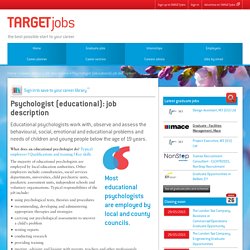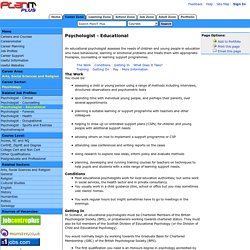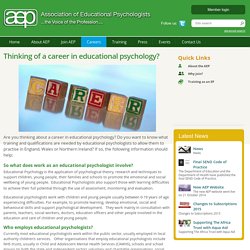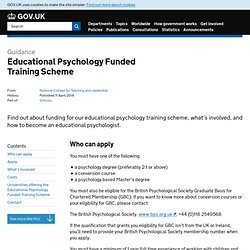

Educational psychologist: Job description. An educational psychologist is concerned with helping children or young people who are experiencing problems within an educational setting with the aim of enhancing their learning.

Challenges may include social or emotional problems or learning difficulties. Work is with individual clients or groups, advising: teachers parents; social workers; other professionals. Client work involves an assessment of the child using observation, interviews and test materials. Educational psychologists offer a wide range of appropriate interventions, such as learning programmes and collaborative work with teachers or parents. They also provide in-service training for teachers and other professionals on issues such as behaviour and stress management. Psychologist (educational): job description. Educational psychologists work with, observe and assess the behavioural, social, emotional and educational problems and needs of children and young people below the age of 19 years.

What does an educational psychologist do? Typical employers | Qualifications and training | Key skills The majority of educational psychologists are employed by local education authorities. Other employers include: consultancies, social services departments, universities, child psychiatric units, paediatric assessment units, independent schools and voluntary organisations. Typical responsibilities of the job include: using psychological tests, theories and procedures recommending, developing and administering appropriate therapies and strategies carrying out psychological assessments to uncover a child's problem writing reports conducting research providing training meeting, advising and liaising with parents, teachers and other professionals advising and making recommendations on educational policies.
PlanIT Plus - Career Zone. This site uses some unobtrusive cookies to store information on your computer.

Some cookies on this site are essential, and the site won't work as expected without them. These cookies are set when you submit a form, login or interact with the site by doing something that goes beyond clicking on simple links. We also use some non-essential cookies to anonymously track visitors or enhance your experience of the site. If you're not happy with this, we won't set these cookies. To control third party cookies, you can also adjust your browser settings. By using our site you accept the terms of our Privacy Policy. (One cookie will be set to store your preference) (Ticking this sets a cookie to hide this popup if you then hit close. About this tool. Educational. C7 ADayintheLifeEDUCATIONAL PSYCHOLOGY. AEP - Careers. Are you thinking about a career in educational psychology?

Do you want to know what training and qualifications are needed by educational psychologists to allow them to practise in England, Wales or Northern Ireland? If so, the following information should help: So what does work as an educational psychologist involve? Educational Psychology is the application of psychological theory, research and techniques to support children, young people, their families and schools to promote the emotional and social wellbeing of young people. Educational Psychologists also support those with learning difficulties to achieve their full potential through the use of assessment, monitoring and evaluation. Educational psychologists work with children and young people usually between 0-19 years of age experiencing difficulties. Who employs educational psychologists? Currently most educational psychologists work within the public sector, usually employed in local authority children’s services.
C-gettingintoedpsych.pdf. Division of Educational & Child Psychology. Early education and childcare. Review of clinical and educational psychology training arrangements report. Educational Psychology Funded Training Scheme - Detailed guidance. Who can apply You must have one of the following: a psychology degree (preferably 2:1 or above) a conversion course a psychology-based Master’s degree You must also be eligible for the British Psychological Society Graduate Basis for Chartered Membership (GBC).

If you want to know more about conversion courses or your eligibility for GBC, please contact: The British Psychological Society, www.bps.org.uk, +44 (0)116 2549568 If the qualification that grants you eligibility for GBC isn’t from the UK or Ireland, you’ll need to provide your British Psychological Society membership number when you apply. You must have a minimum of 1 year full-time experience of working with children and young people within: education health social care youth justice a childcare or community setting Full time means 37 hours a week, or the equivalent if part time. This can be made up of either: You must be eligible to work in England for the duration of the course and for at least 2 years afterwards. Apply Costs. C7 EducationalPsycholasCareerChoice. Hilaryclark.pdf.